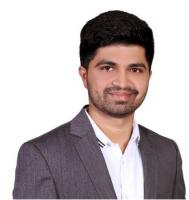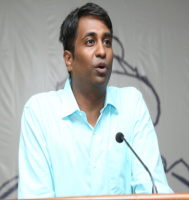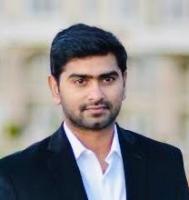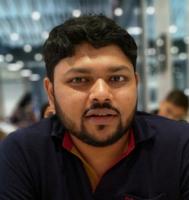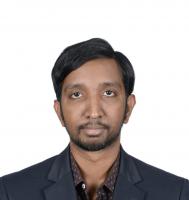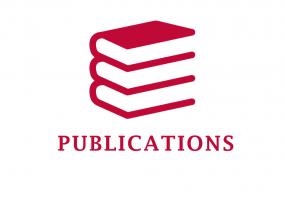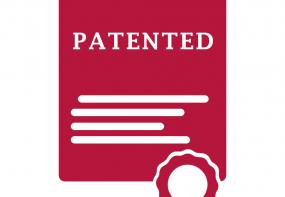School of Electrical and Electronics

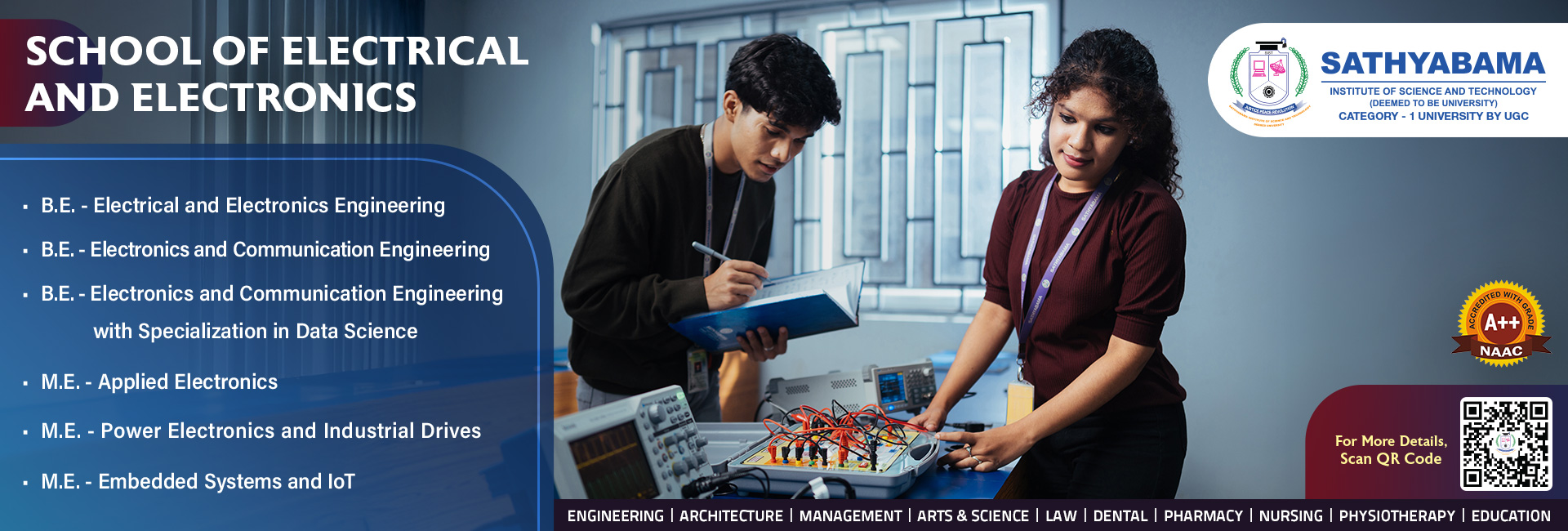
School of Electrical and Electronics Engineering consistently and competently drives towards excellence through our departments of Electronics and Communication Engineering, Electrical and Electronics Engineering and Electronics and Instrumentation Engineering. With a strong emphasis,on holistic development of a student, School of Electrical and Electronics groomed the multidisciplinary powers of the students ,enhances the skill set of student by providing hands on training, workshops and research in the frontiers of Artificial Intelligence , Machine Learning, Signal/Image Processing, VLSI Design, Power Electronics,Electric Vehicle, Embedded systems,Contemporary Wireless Communication, Wind Energy, Nanotechnology and 5G Communications.
The School has state-of-the art laboratories in almost all the frontiers of Electrical, Electronics and Instrumentation Engineering. The School has the latest simulation tools in its laboratories to cater various specializations and is equipped with facilities for measurement, characterization and synthesis of experimental as well as theoretical results.
Our school has developed on board communication subsystem, ground station control, electronic power supply, attitude determination control systems and has calibrated spectrometer for the successful launch of “SATHYABAMASAT" on June 22nd, 2016. Mission of ‘SATHYABAMASAT’ to measure greenhouse gases emission is made successful through continuous collection and processing of satellite data by our students from the ground station in our premises. Combined expertise of staff and students of our school has resulted around 30 research projects sponsored by government and R&D organizations like DST, IGCAR, BRNS, BRFST, TNSCST, ISRO, DRDO.
It opens a wide spectrum of opportunities for placement in dream companies not only limited to his area of study. It is evident in the consistent placement record of over 95% every year in every department of the school. Some of our major recruiters are Samsung, HP Electronics,Renault Nissan, Tata Communications,Nokia, Bosch, Amazon, NTT Data, MBIT Wireless, Wipro, HCL Technologies, Infosys, Capgemini, L & T Infotech, Tech Mahindra. etc. Excellent infrastructure, expert faculty members and enthusiastic students have also made remarkable contributions in product development, patents and paper publications.
Our Top Recruiters
STUDENT TESTIMONIALS
Department of Electrical and Electronics Engineering was established in the year 1992 to offer UG Program in Electrical and Electronics Engineering. Having consistently grown in terms of competence and expertise in the field of Electrical and Electronics Engineering, the department is also offering Post Graduate Program in Power Electronics and Industrial Drives and Doctoral Research programs from 2002. The Program imparts strong and wide knowledge in the most profound areas such as Electrical Drives, Control Systems, Power Systems, Power Electronics, etc. and the associated laboratory courses. The program also includes courses in other relevant branches of Engineering such as Computer Science, Mechanical and Electronics domain. The Department is enriched with well qualified faculty members and skilled technical assistants. The faculty members enthusiastically involve with students in research activities and always dedicated towards the growth of the students. Faculties have been awarded as Toppers, Top Performing Mentors and Discipline Star in NPTEL courses. The Department has received funding from DST-SERB, AICTE-RPS, MHRD-UBA and TNSCST. The curriculum has been framed consciously to cater the needs of core electrical sectors and Information Technology organizations. The department placement record has always been very impressive.
Students have been placed in various core companies such as Robert Bosch, µsigma, BGR Energy, FLSmidth and IT giants like TCS, CTS, Wipro, Infosys, Accenture, MindTree, etc. Graduate Students are eligible to pursue post graduation on a broader domains such as Power Electronics, Power System, Electrical Machines and Drives, Control Systems, High Voltage Engineering, Applied Electronics, Embedded Systems, Nano Electronics, VLSI, Computer, Networking etc., offered by the National / International Universities. Faculties and students are members of professional bodies such as Institute of Electrical and Electronics Engineers (IEEE), Institution of Engineers (India) (IEI) , Indian Society for Technical Education (ISTE), International Association of Engineers (IAENG), International Federation of Automatic Control (IFAC), Institute of Electronics and Telecommunications Engineers (IETE) and International Society for Research and Development (ISRD).
The Department imparts strong theoretical foundation and aims at producing novel and moral Electrical and Electronics Engineers. Good design experience and exposure to research and development lays a platform and articulates interest among the students. Professionals graduated from our esteemed department will be able to mend and orient themselves according to the industrial requirement and infused to take up challenging jobs. The department encourages students to present their research findings in technological forums such as symposiums, conferences and journals. Students are appreciated and awarded for their outstanding academic performance and research contributions. Our students are privileged to avail extensive exposure on all kinds of technical knowledge sharing forums happening in national / international level. Our eminent alumni frequently address the students for building awareness on the updated industrial requirements and equipping for the same.
Research
- Funded Projects
- Publications
- Patents
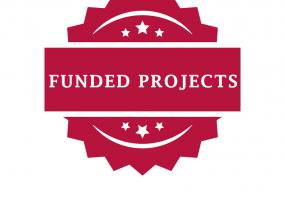
- Department of Electrical and Electronic Engineering constantly encourages faculty community to actively participate in sponsored projects from various funding agencies. Faculty and students in association with ISRO have designed, developed and tested “Flight model of Electrical power supply” for the successful launch and mission of “SATHYABAMA NANOSAT” to collect data on greenhouse gases. It was launched along with the Cartosat-2C satellite a top PSLV-C34.
- Organic Waste to Electricity Conversion : Unnat Bharath Abhyan has sanctioned Rs. 50,000/- during the academic year 2019-2020. The Principal Investigator of the project is Dr..D.Susitra, Associate Professor, Department of EEE, Sathyabama Institute of Science and Technology, Chennai.
- Internet of Things Based Signal Processing Techniques For Predictive Maintenance And Remote Condition Monitoring Of Elevators: All India Council for Technical Education (AICTE), New Delhi, has sanctioned Rs. 12,00,000/- under Research Promotion Scheme (RPS) during the academic year 2021-2022. The Principal Investigator of the project is Dr. W. Abitha Memala, Associate Professor and Co-PI Dr. C. Bhuvaneswari, Assistant Professor Department of EEE, Sathyabama Institute of Science and Technology, Chennai.
The Department of Electrical and Electronics Engineering endeavors to be a globally recognized department for outstanding education and research leading to well qualified engineers, who are innovative, entrepreneurial and successful in advanced fields of Electrical and Electronics Engineering to cater the ever changing industrial demands and social needs.
- To impart quality education to the aspiring Engineers through effective teaching-learning techniques to enhance their skills, capacity and make them globally competitive Electrical Engineers.
- To develop collaborations with various Research & Development Organizations, Educational Institutions and Industries for excellence in Research, Teaching, and Consultancy practices.
- To provide the students with academic environment of excellence needed for a long productive career.
- To mould the young dynamic potential minds to make them industry ready and help them to emerge as full-fledged professionals or entrepreneurs to serve the society.
The Program Educational Objectives are as follows:
- PEO 1: Perform strong technical competency in the field of Electrical and Electronics Engineering to provide effective and sustainable solutions.
- PEO 2: Commit themselves with research attitude, lifelong learning, investigative approach and multidisciplinary thinking required to meet the changing industrial trends.
- PEO 3: Excel with entrepreneurial skills to achieve personal and professional success.
- PEO 4: Exhibit leadership qualities in their career, respecting the ecosystem with strong ethics and actively contribute in private and government sectors.
- PO1 Engineering knowledge: Apply the knowledge of mathematics, science, engineering fundamentals, and an engineering specialization to the solution of complex engineering problems.
- PO2 Problem analysis: Identify, formulate, review research literature, and analyze complex engineering problems reaching substantiated conclusions using first principles of mathematics, natural sciences, and engineering sciences.
- PO3 Design/development of solutions: Design solutions for complex engineering problems and design system components or processes that meet the specified needs with appropriate consideration for the public health and safety, and the cultural, societal, and environmental considerations.
- PO4 Conduct investigations of complex problems: Use research-based knowledge and research methods including design of experiments, analysis and interpretation of data, and synthesis of the information to provide valid conclusions.
- PO5 Modern tool usage: Create, select, and apply appropriate techniques, resources, and modern engineering and IT tools including prediction and modeling to complex engineering activities with an understanding of the limitations.
- PO6 The engineer and society: Apply reasoning informed by the contextual knowledge to assess societal, health, safety, legal and cultural issues and the consequent responsibilities relevant to the professional engineering practice.
- PO7 Environment and sustainability: Understand the impact of the professional engineering solutions in societal and environmental contexts, and demonstrate the knowledge of, and need for sustainable development.
- PO8 Ethics: Apply ethical principles and commit to professional ethics and responsibilities and norms of the engineering practice.
- PO9 Individual and team work: Function effectively as an individual, and as a member or leader in diverse teams, and in multidisciplinary settings.
- PO10 Communication: Communicate effectively on complex engineering activities with the engineering community and with society at large, such as, being able to comprehend and write effective reports and design documentation, make effective presentations, and give and receive clear instructions.
- PO11 Project management and finance: Demonstrate knowledge and understanding of the engineering and management principles and apply these to one’s own work, as a member and leader in a team, to manage projects and in multidisciplinary environments.
- PO12 Life-long learning: Recognize the need for and have the preparation and ability to engage in independent and life-long learning in the broadest context of technological change.
SO1 (APPM): An ability to identify, formulate and solve complex engineering problems by
applying principles of engineering, science, and mathematics.
SO2 (APPM) : An ability to apply engineering design to produce solutions that meet specified needs with consideration of public health, safety and welfare, as well as global, cultural, social, environmental and economic factors.
SO3 (APPM) : An ability to communicate effectively with a range of audience.
SO4 (APPM): An ability to recognize ethical and professional responsibilities in engineering situations and make informed judgments, which must consider the impact of engineering solutions in global, economic, environmental and societal contexts.
SO5 (APPM): An ability to function effectively on a team whose members together provide leadership, create a collaborative and inclusive environment, establish goals, plan tasks and meet objectives.
SO6 (APPM) : An ability to develop and conduct appropriate experimentation, analyze and interpret data and use engineering judgment to draw conclusions.
SO7 (APPM): An ability to acquire and apply new knowledge as needed, using appropriate learning strategies.
| PO | Description | Correlation with SO (APPM) |
|---|---|---|
| PO1 | Engineering knowledge: Apply the knowledge of mathematics, science, engineering fundamentals and an engineering specialization to the solution of complex engineering problems. | SO1(APPM) |
| PO2 | Problem analysis: Identify, formulate, review research literature and analyze complex engineering problems reaching substantiated conclusions using first principles of mathematics, natural sciences and engineering sciences | SO1(APPM) |
| PO3 | Design/development of solutions: Design solutions for complex engineering problems and design system components or processes that meet the specified needs with appropriate consideration for the public health and safety and the cultural, societal, and environmental considerations. | SO2(APPM) |
| PO4 | Conduct investigations of complex problems: Use research-based knowledge and research methods including design of experiments, analysis and interpretation of data, and synthesis of the information to provide valid conclusions. | SO6(APPM) |
| PO5 | Modern tool usage: Create, select, and apply appropriate techniques, resources, and modern engineering and IT tools including prediction and modeling to complex engineering activities with an understanding of the limitations. | SO7(APPM) |
| PO6 | The engineer and society: Apply reasoning informed by the contextual knowledge to assess societal, health, safety, legal and cultural issues and the consequent responsibilities relevant to the professional engineering practice | SO4(APPM) |
| PO7 | Environment and sustainability: Understand the impact of the professional engineering solutions in societal and environmental contexts, and demonstrate the knowledge of, and need for sustainable development | SO4(APPM) |
| PO8 | Ethics: Apply ethical principles and commit to professional ethics and responsibilities and norms of the engineering practice. | SO4(APPM) |
| PO9 | Individual and team work: Function effectively as an individual, and as a member or leader in diverse teams, and in multidisciplinary settings. | SO5(APPM) |
| PO10 | Communication: Communicate effectively on complex engineering activities with the engineering community and with society at large, such as, being able to comprehend and write effective reports and design documentation, make effective presentations, and give and receive clear instructions. | SO3(APPM) |
| PO11 | Project management and finance: Demonstrate knowledge and understanding of the engineering and management principles and apply these to one’s own work, as a member and leader in a team, to manage projects and in multidisciplinary environments. | SO5(APPM) |
| PO12 | Life-long learning: Recognize the need for and have the preparation and ability to engage in independent and life-long learning in the broadest context of technological change. | SO7(APPM) |
- PSO1: Apply the acquired fundamental knowledge in the field of Power Generation, Transmission, Distribution, Protection and Utilization of Electrical Power.
- PSO2: Design, analyze, control and evaluate the performance of Electrical drives for high power applications.
- PSO3: Design and develop Electronic Circuits and Embedded Systems for real time applications.
- Faculty and students in association with ISRO have designed, developed and tested “Flight model of Electrical power supply” for the successful launch and mission of “SATHYABAMA NANOSAT” to collect data on greenhouse gases. It was launched along with the Cartosat-2C satellite a top PSLV-C34
- The department has on going sponsored projects from UBA - (Unnat Bharat Abhiyan)
- DST-SERB, TNSCST sponsored Seminars/ FDP’s organized by the department.
- Centre of excellence laboratories on Internet of things is setup in association with Texas Instruments.
- EMERSON control technique sponsored servo motor drive is setup in power electronic laboratories for research activity of faculty and PG students.
- Excellent infrastructure with state of art laboratories.
- Many University inhouse projects are developed and installed by faculty and student of the department.
- Consecutive placement record of 85% and above record.
- Faculty and Students are member of professional body like IEEE, IEI and ISTE student chapters.
Sathyabama Institute of Science and Technology places emphasize on co-curricular and extracurricular activities These activities are student centered and primarily aims to supplement regular curricular activities.Its goal is to represent the student body in making the study experience as rewarding and enjoyable as possible.
-
Academic Calendar
-
Student Council
-
Course Materials
-
Scholarship Scheme
-
Advisory Bureau for Higher Studies
-
Student Development Cell
-
Student Chapter
-
Counselling Services
-
Help Desk
-
Anti Ragging Cell
-
Women Grievance Cell
-
SC / ST Cell
-
Industry Institute Interaction Cell
-
Anti - Discrimination Cell
-
Students Grievance Redressal Cell
-
Student Achievements
-
Student Handbook
-
Entrepreneurship Development Cell
-
Skill Development Centre
-
Internal Complaint Committee
-
NCC/NSS/YRC
Centre for Academic Partnership & International Relations is an initiative of Sathyabama Institute of Science and Technology devoted to promote academic alliances with Universities and Institutes at National and International level. The Centre establishes a link through Memorandum of Understanding to facilitate Research Collaboration, Student Exchange Programmes and Faculty Exchange Programmes.
Insights
- Collaboration and MOU's
- Facilities
A memorandum of understanding (MoU) is a formal agreement between two or more parties. Companies and organizations can use MoUs to establish official partnerships. MoUs are not legally binding but they carry a degree of seriousness and mutual respect, stronger than a gentlemen's agreement.
Memorandum of Understanding between Sathyabama Institute of Science and Technology and L & T Switchgear Training Centre
- To enhance the quality of educational experience for students, researchers and to expertise people in the field of upcoming renewable energy.
- To make skilled solar engineers for huge careers opportunities.
- To create awareness and encourage people to implement solar system.
- Share new research and developments, innovations, applications, career opportunities.
Memorandum of understanding with Tamilnadu Advanced Technical Training Institute (TATTI)
- The MoU is intended to recognize the general basis for a cooperative and a collaborative working relationship between the two parties.
- The purpose of MoU is to have mutual intentions to jointly work on projects required for industries and research needs, with learned faculty of good industrial experience and promising students and to exchange their expertise for mutual benefit and growth.
- To establish collaboration between the Institution and Industry with a view of providing a window to the world of industry within the educational institution.
Memorandum of understanding with Texas Instruments, authorized partner Digital Shark Technology private limited, Bangalore
- The scope of this MOU is to provide a framework of reference to build a strong and on-going relationship between Sathyabama institute of science and technology and Digital shark technology in various areas of mutual interest and benefit.
- The primary goals are to conduct workshops and faculty development programs in the field of embedded systems and IOT.
Memorandum of Understanding between Sathyabama Institute of Science and Technology and HCL

MOU with HCL Technologies, Chennai
Industry Institute interaction bridges the gap between theoretical science and technological advances. Having understood clearly, school of Electronic has Memoranda of Understanding with HCL Technologies, Qmax Technologies and BSNL. Centres of excellence are established through this MOU and a series of activities from hands on training to direct placement are carried out.
Tamilnadu Advanced Technical Training Institute (TATTI) with Department of EEE Sathyabama Institute of Science & Technology signed an MOU dated 11th May 2022 requesting Internship to our Students, establishing Renewable Electric Energy laboratory, Placement activity, etc.

Department of Electrical and Electronics Engineering,Sathyabama Institute of Science & Technology signed an MOU with Transun Energy India Pvt Ltd, Chennai dated 2nd August 2023 requesting Consultancy activities, Guest lecture, Internship to our Students,Collabrative reasearch and Short term training to faculty members.
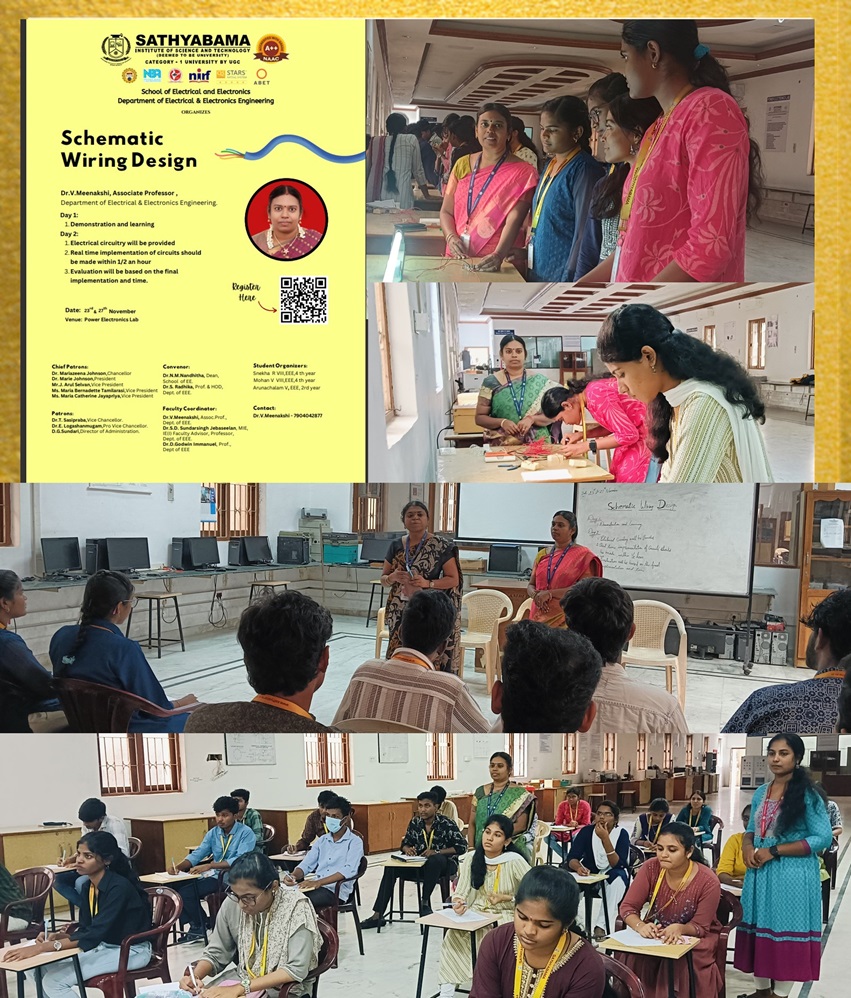
The Department of Electrical and Electronics Engineering conducted a highly engaging two-day workshop on Schematic Wiring Design on 23rd and 26th November 2024, led by Dr. V. Meenakshi. Day 1 focused on hands-on demonstrations, where participants learned the essentials of circuit design, schematic diagrams, and troubleshooting, using industry-standard tools and software. On Day 2, the workshop featured a Circuit Connecting Competition, where students applied their learning to create accurate and efficient circuits. The competition fostered teamwork, problem- solving, and quick thinking, with the top teams being awarded winner certificates and T-shirts. All participants received certificates for their involvement. Students expressed great enthusiasm, appreciating the practical learning experience and the opportunity to interact with an expert in the field. Many noted how the workshop improved their understanding of schematic design, while the competition added a fun, competitive element that reinforced their skills. Overall, the event was a resounding success, offering both educational value and a chance to build valuable skills for their future careers.
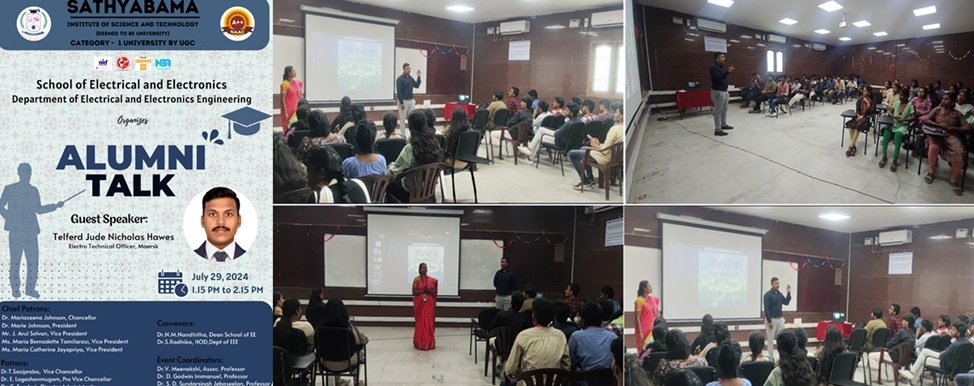
The Department of Electrical and Electronics Engineering at Sathyabama Institute of Science and Technology hosted an enriching Alumni Talk event on July 29, 2024, organized by Dr. V. Meenakshi, Associate Professor EEE. The session featured a distinguished alumnus, Mr. Telferd Jude Nicholas Hawes, who currently serves as an Electro Technical Officer at Maersk. The event, well-attended, with students from final year of the Electrical and Electronics Engineering Undergraduate program, aimed to inspire and educate current students by providing them with insights into the practical applications of their studies and the diverse career opportunities in the field of Electrical and Electronics Engineering. The event was a resounding success, providing students with a valuable perspective on the real-world applications of their academic learning and inspiring them to pursue excellence in their chosen careers.
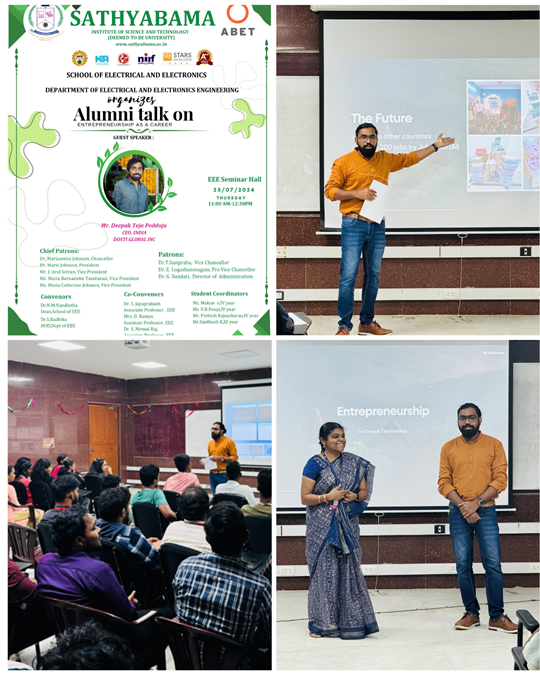
Department of Electrical and Electronics Engineering organized an Alumni talk on “ENTREPRENEURSHIP AS A CAREER” on 25/07/2024 for the EEE Students. Mr.DEEPAK TEJA PEDDOJU, CEO INDIA, DOSTI GLOBAL INC discussed the scope and opportunities of entrepreneurship. He also suggested open ideas that can be taken as a career. The students felt the session very useful and he feedback was good.
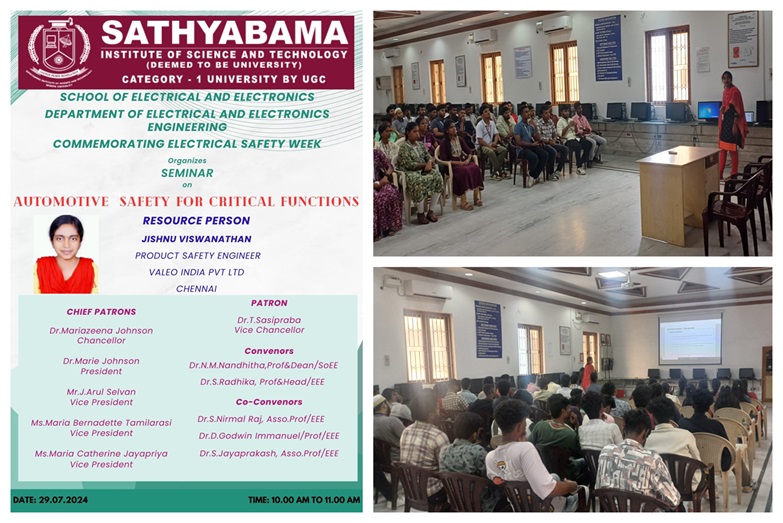
Department of Electrical and Electronics Engineering organized a seminar on "Automotive Safety for Critical Functions" on 29th July 2024 for the III year EEE Students (Batch 2022-2026). Ms.Jishnu Viswanathan, Product Safety Engineer, Valeo India PVT LTD, Chennai, briefed about implementing the safety measures in the key systems of a vehicle, such as braking, steering, and powertrain, to operate reliably and safely under all conditions. The Seminar received positive feedback from the students.
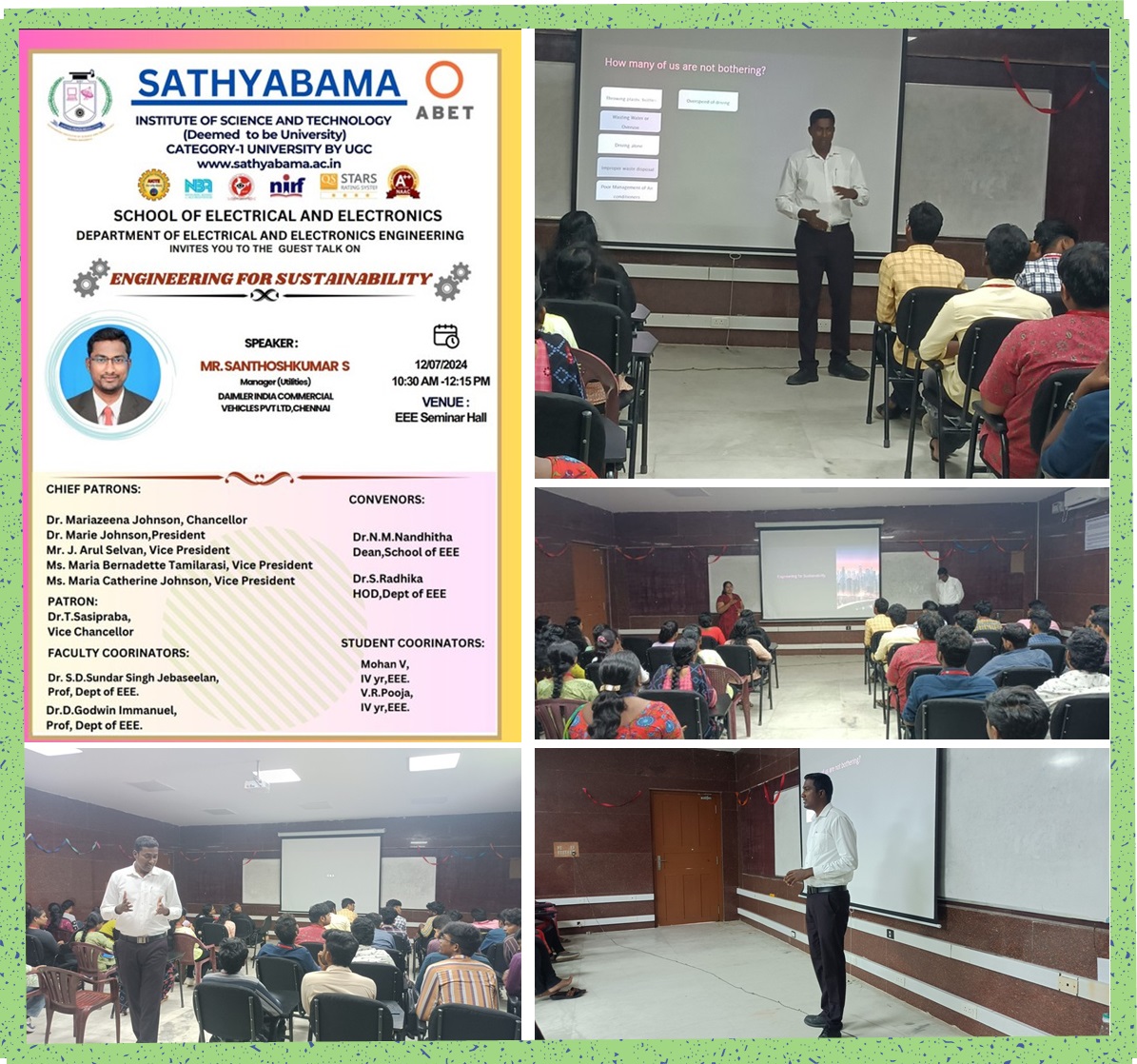
On July 12, 2024, Sathyabama institute of Science and Technology Electrical and Electronics Engineering department hosted an enlightening event titled "Engineering for Sustainability." The highlight of the event was a guest talk delivered by Mr. Santhosh Kumar S., Manager (Utilities) at Daimler India Commercial Vehicles Pvt. Ltd., Chennai. The session focused on the critical importance of sustainability in engineering practices, particularly within the automotive industry. He emphasized the role of innovative engineering solutions in achieving sustainable development goals, highlighting Daimler India's initiatives in this regard. His talk provided valuable insights into how technological advancements and responsible engineering can mitigate environmental impact while fostering industrial growth. Feedback from the students indicated a highly positive response to Mr. Santhosh Kumar's presentation. They appreciated the practical examples shared from his professional experience, which illustrated the real-world applications of sustainable engineering principles. Many students found the session inspiring and insightful, noting that it broadened their perspective on the role of engineers in addressing global challenges like climate change and resource conservation. Overall, the event served as a platform for students to gain knowledge about sustainable engineering practices and interact directly with industry professionals like Mr. Santhosh Kumar S. His expertise and experiences provided a motivating glimpse into the future of engineering, encouraging students to consider sustainability as a cornerstone of their professional careers.
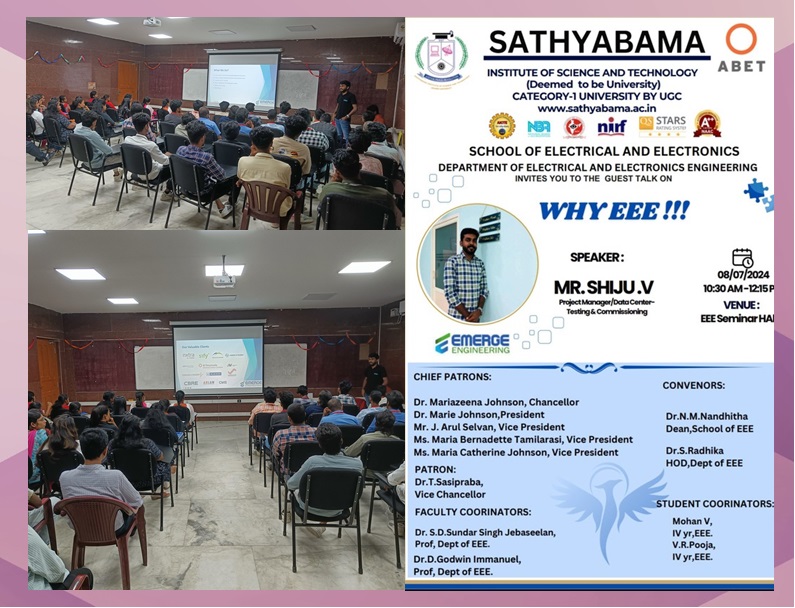
The Electrical and Electronics Engineering Department of Sathyabama Institute of Science and Technology hosted a compelling guest talk on the topic "Why EEE?" The session was conducted on the 8th of July, 2024, and featured Mr. Shijiu, an esteemed Project Manager specializing in data center testing and commissioning from Emerge Engineering Company. The event was aimed at providing students with valuable insights into the significance and scope of Electrical and Electronics Engineering.Mr. Shijiu, a seasoned professional in the field of data center testing and commissioning, brought with him a wealth of knowledge and experience. His extensive background in project management and engineering made him an ideal speaker to address the curious minds of EEE students.Overall, the session broadened students perspective on what being an EEE engineer entails. It was a perfect blend of technical knowledge and career advice, which students found very beneficial for their academic and professional growth."
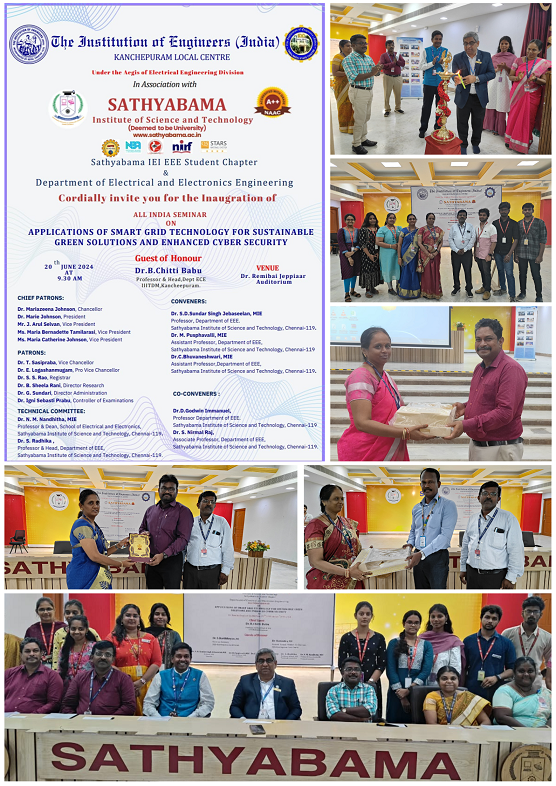
The Department of EEE, in collaboration with IEI EEE Student Chapter, KLC, hosted a Two-Day Sponsored All India Seminar on "Applications of Smart Grid Technology for Sustainable Green Solutions and Enhanced Cybersecurity" from June 20 to June 21, 2024. Dr. Ramesh S, Chairman of IEI KLC, and Dr. Chitti Babu, Professor & Head of IIITDM Kanchepuram, were esteemed guests at the inaugural session. The seminar featured sessions led by industry experts such as Dr. M. Rameshbabu on the challenges and potential of smart grids, Mr. T. Absorn on AI's role in future energy solutions, and Er. G. Rajaganesan on trends in energy management and grid analytics. It aimed to delve into how smart grid technology can drive sustainable energy solutions and fortify cybersecurity in the field. Student feedback highlighted the seminar's relevance and the practical insights gained into emerging technologies in the energy sector.

Department of Electrical and Electronics Engineering conducted a Two Weeks Value Added Course on the topic “Arduino and Tinkercad Mastery: From Simulation to Real-World Implementation“ from 29.01.2024 to 10.02.2024 in which 36 students have participated. This comprehensive program aimed to equip students with practical skills in utilizing Arduino microcontrollers and Tinkercad simulation tools, bridging the gap between theoretical knowledge and real-world application.The course delved into Arduino programming languages, enabling students to write, upload, and troubleshoot code for various applications.Transitioning from simulation to reality, the students were guided in implementing their designs on physical Arduino hardware. This hands-on experience enhanced their understanding of challenges related to hardware connections and debugging.

Department of Electrical and Electronics Engineering Conducted a Workshop on “Drone and its Applications” from March 5th to March 11th. The Speaker was Mr.T. Ariharan,Drone Technology Consultant,Sathyabama Institute of Science and Technology. The Program was attended by more than 45 Students of Third Year EEE Department. The Workshop initially gave a overview on Drone, its applications and different Mechanisms of Drone. Mr. Ariharan explained about the Rules and Regulation to be followed when implementing the Drones. The other sessions explained in detail about the different applications like Agriculture, Defense, Map Creation for any Specified Location. The staff also introduced about the Software App SCRATCH for controlling the Operations of TelloDrone. Also the real time application was described by integrationg the entire system in Python. The entire Workshop was very informative and the students gave a Knowledge Gaining feedback.

A seminar on “ Towards a Transformed INDIA-Realizing the vision of Viskit Bharat @2047” organized by the Department of Electrical and Electronics Engineering at Sathyabama Institute of Science and Technology on 13.03.2024 was a successful one. The seminar aimed to explore the different field of electrical engineering, particularly focused on renewable energy and sustainable technologies to fulfill the vision of Viskit Bharat at 2047. The students eagerly listened and participated in the discussion that was conducted at the end of the seminar. Several novel ideas were shared and discussed. The seminar was an eye opening session for the students to transform our country into a developed nation by 2047.

Department of Electrical and Electronics Engineering celebrated International Women's Day on March 8th 2024, honoring the social, economic, cultural, and political achievements of women worldwide. Various events were conducted and the girls participated enthusiastically in all technical and non technical events. The events received appreciable feedback from the participants.

Department of Electrical and Electronics Engineering organized a five days FDP on ‘Artificial Intelligence, Machine Learning, and Renewable Energy Sources-An Integrated Approach’. This FDP has been scheduled from 18-3-24 to 22-3-2024 in hybrid mode exclusively for faculties from various discipline. The eminent personnel from various reputed institutions exhibited their technical exposure to all the participants. Really this was an effective forum to share the knowledge and innovative ideas among the participants. This program has been organized by Dr.V.Meenakshi, Associate Professor/EEE, SIST, Chennai. The participants gave a constructive feedback and overwhelmed response about the FDP program

Department of Electrical and Electronics Engineering organized a Student Outreach program on 23th February 2024 at Panchayat Union Primary School in Kamarajapuram, Kattankolathur Block, Guduvancheri, Chengalpattu District. The program was attended by 40 boys and 19 girls, accompanied by Dr. S. Jayaprakash, Associate Professor. During the event, II-year EEE, III-year EEE, NSS and NCC students interacted with the school students. They explained basic English, Mathematics, and Science concepts in an interesting way. Additionally, tree plantation activity in the school was also conducted. The outreach program proved to be beneficial, as the student’s gained societal experience through these sessions. It was also joyful experience as the school students enthusiastically absorbed all the concepts, thoroughly enjoying the program. Their feedback about the program was overwhelmingly positive.

Department of Electrical and Electronics Engineering organized a seminar on “Intellectual Property Rights”. The seminar was scheduled on 7th February 2024 from 11:15 am to 12:15 pm for II year EEE (2023-2027) batch students. The seminar helped the students to enhance, widen and deepen their knowledge on various types of intellectual property rights. The seminar received positive feedback from the students.

Department of Electrical and Electronics Engineering organized a seminar on "Automotive Functional Safety" on 30th January 2024 for the III year EEE Students (Batch 2021-2025). Mr.Vijayan Udhayakumar, Architect 1, Product Safety, Valeo, Chennai, explained the design and implementation of safety measures in the hardware of vehicles to prevent accidents and protect occupants and other road users from harm. The guest talk received positive feedback from the students.

Department of Electrical and Electronics Engineering organized a seminar on "Functional Safety in Automotive Electronics" on 20th December 2023 for the IV year EEE Students (Batch 2020-2024).Mr.Karan Bedi, Senior Engineer Product Safety, Valeo, Chennai, explained the implementation of protective measures to eliminate or mitigate hazards caused by the failure or unintended behavior of a vehicle-level system. The guest talk received positive feedback from the students.

Department of Electrical and Electronics Engineering organized a guest talk on "Business Use Cases of IoT Powered by Cloud Technology" on 19th October 2023 for the I year EEE Students (Batch 2023-2027).Mr.Premkumar, Consultant, TCS Chennai explained the use cases of IoT in various industries like Healthcare, Utilities and Energy, Transportation and Logistics etc. The guest talk received positive feedback from the students.

Department of Electrical and Electronics Engineering of Sathyabama Institute of Science and Technology, Chennai has organized a guest talk on, “Power Transmission and Distribution from Substation", on 18.10.2023. Chief Guest, Mrs. B. C. V. Priya M.E., Junior Engineer, from 110KV Panjety Substation, Chennai, delivered lecture and nearly 100 students from first and second year were benefitted.

Department of Electrical and Electronics Engineering organized a guest talk on "Introduction and Benefits of Intellectual Property Rights" on 16th October 2023 for the II year EEE Students (Batch 2022-2026). Dr.Stanley Abraham Professor, Research, SIST briefed the session with the primary functions and benefits of intellectual property rights. The students gave remarkable feed back about the event.

The Talent Hunt Event, hosted by the Department of Electrical and Electronics Engineering at Sathyabama Institute of Science and Technology, under the guidance of EEE Department staff coordinators Dr. V. Senthil Nayagam and Dr. M. Kavitha, unearthed a wealth of talents among the first-year students of the EEE department's 2023-2027 Batch during the period from August 23, 2023, to August 31, 2023. These talents transcended academic boundaries, extending into the realm of creativity.
ELECTRICAL MACHINES LABORATORY

View of Electrical Machines Lab
The Electrical Machines lab is well equipped with extensive collection of various types of machines namely AC machines, DC Machines and Transformers with suitable loading arrangements. The main purpose of this laboratory is to provide the students with practical knowledge of handling electrical machines and correlate the theoretical classroom treatment with actual machine characteristics. This lab can be utilized to educate engineering researchers and to conduct research in all aspects of electrical and electromechanical energy conversion. This lab is equipped with excellent facilities for Measurements and control. The Lab Facilities are utilized for practical studies of control systems. Moreover the Reverse Engineering process can be done for better understanding of wiring, motor winding, machine construction, design and safety in electrical systems.
CIRCUITS AND DEVICES LABORATORY

View of Circuits and Devices Lab
The circuits and devices Laboratory is the gateway for the students to the electronics world. At the beginning, the students get exposed to the various electronic components in order to make them design complex circuits in future. Later, they also learn to design and build simple electronics circuits so that their engineering skills are enriched. This lab also paves the way to learn fundamentals of digital electronics. Here the students experimentally verify the operation of different digital circuits. The correlation between the theoretical concepts of various analog electronics circuits with practical and their feasibility is also learned through the conduction of different experiments using OPAMP IC741and Timer IC555. This lab is also intended for the students to acquire in depth practical knowledge of theoretical laws, different circuit components and their functioning in electrical circuits. This lab enables the students to design and test circuits using bread board or using simulation software. Thus the acquired knowledge aid the students to pursue real time projects in future.
POWER ELECTRONICS LABORATORY

View of Power Electronics Lab
Power electronics laboratory comes under the department of electrical and electronics engineering. In this lab students learn conversion of electric power from one form to another form in single phase and three phase using power semiconductor devices like power SCR, power MOSFET, power IGBT etc. They also learn to control the power for electric drives like PMDC motor drive, DC motor drive, Induction motor drive, PMSM drive Switched reluctance motor drive, PMBLDC motor drive and AC servo motor based Emerson control drive. The students also get exposure to industry like setup in AC motor drives. This lab provides powerful simulation tools like MATLAB2018, PSIM7.1 for research scholars in the field of power electronics.
POWER SYSTEMS LABORATORY

View of Power System Lab
The Power System Laboratory research areas include modeling, simulation, and optimization of electric power systems (reliability); and planning, protection, automation, control and power quality. The lab is equipped with power system simulation software and hardware simulators such as power system micro-models fitted with protective relays, remote terminal units (RTUs), and supervisory control and data acquisition (SCADA). Also here in Power System Lab, Programmable Logic Controller executed with the Ladder logic programming is used for real time knowledge acquiring. The lab has MIPOWER 9.1 package which is utilized specially for power system planning, stability, load flow Analysis and Short circuit studies. MATLAB software is used for simulation and coding in power system modeling.
EMBEDDED SYSTEMS LABORATORY

View of Embedded system Lab
The Embedded Systems Laboratory (ESL) is part of Department of Electrical & Engineering and focuses on the definition of system-level design methods, optimization methodologies and tools for high-performance embedded systems. This laboratory serves the practical sessions for Microcontrollers Embedded Programming and Embedded Systems Design. Provide hands-on experience with developing, debugging, and simulating an embedded system. IOT innovation laboratory in association with Texas Instruments attached to the department enables the students to gain knowledge on various sensors, interfacing and control using microcontrollers through IOT by means of workshops
The curricula of programmes have been designed to cater to the ever changing needs and demands of industry. The focus is on holistic learning and empowering students to make significant contributions at all levels.
Click here to Download - Regular
Click here to Download - Part Time
Sathyabama Satellite(SAT)

Susecessful Installation for Sathyabama SAT Power Supply Module

Prime Minster Modi greeted our students and staff for Sathyabma SAT
International Space Research Institute, Leipzig, Germany

Proudly presenting our EEE student Sangramijith Mukharjee at NASA
NASA has organized the event in International Space Research Institute, Leipzig, Germany.one of the student in EEE dept has participated in NASA Human Exploration Rover Challenge 2016 held at USA from 8th to 9th April 2016 and won “Jesco Von Puttkemar Award” for Best International Team
Chhatri viswakarma award

Proudly presented Chhatri Viswakarma award of our Staff and Students at New Delhi
Siemens Healthineers

Students received third prize at Siemens Healthineers Bangalore
Innovation Management and leadership program conducted in 2019 at siemens Healthineers Bangalore office. It was around 5 days where 30 students were selected out of large number of applications. From sathyabama Institute of science and technology, we are three students selected and participated along with wining third prize for the idea to control and monitor diabetes using new technology
National Cadet Corps(NCC)

Our NCC students
Best paper award

Proudly presenting our departments students for received best paper award
SSN college of Engineering has organized Basic Robotic contest in 2018.Four of the students from sathyabama Institute of science and technology in EEE dept has participated and wining first prize in paper presentation
Sathyabama Institution's Innovation Council (IIC) - Project Expo

Students received first prize in Sathyabama IIC
National level symposium

Final year students handed over award winning trophy to our Chancellor and President of our University
Kuse Harish and team has awarded with certificate of achievement in National level techno management symposium held at Anna university
State level Hockey Tournament

Divya R received State level Hockey Tournament
National Robotics Football League Championship

Our Students and Staff designed Robo for National Robotic Football League Championship
National level karate championship 2020
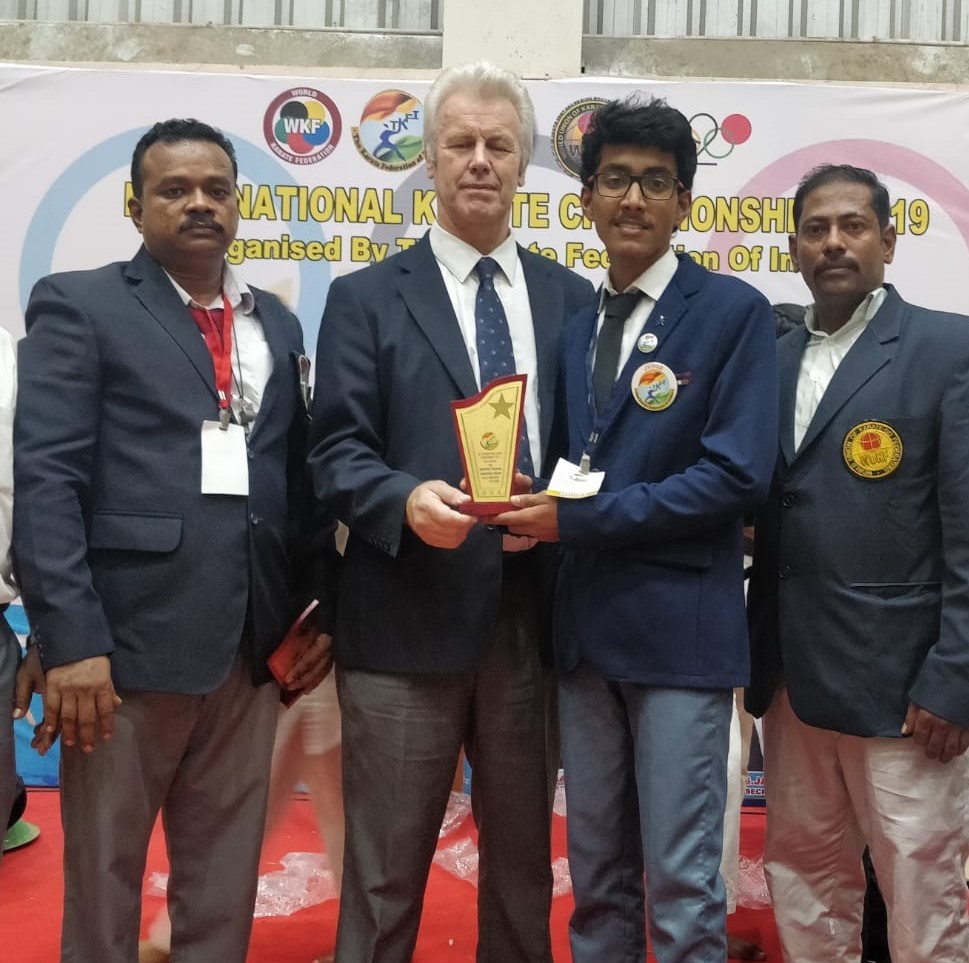
Keshav Sridhar receiving First price in Karate championship
The Placement and Training cell acts as an interface between the students and industries and is dedicated to help the students towards their campus placement and industrial training. Throughout the year, senior executives and alumni from a variety of industry and enterprise participate in scheduled informal discussions on industry and career trends. Representatives share practical advice and insights gained from their own backgrounds and experiences. The campus placement activities are regularly carried out every year for all the students of the department. The campus placement offers three kinds of jobs namely Core, IT and ITES for the students. The Department of Electrical and Electronics Engineering has always been the choice for many recruiters, who come back year after year in search of fresh minds. Students have been placed in various core companies such as Robert Bosch, Musigma, BGR Energy, FLSmidth and IT giants like TCS, CTS, Wipro, Infosys, Accenture, MindTree, etc.
Edupolis, a leading provider of business programs and management coaching for educational leaders has selected our students through our Campus Recruitment program
Our Students placed in Edupolis Company through our Campus Recruitment Program
Sybrant, a leading software services company helping customers with higher business efficiencies using modern techniques has selected of our students through our Campus Recruitment program
Our Students placed in sybrant Company through our Campus Recruitment Program
NTT DATA, an Innovation Partner, Head quartered in Tokyo, with business operations in more than 50 countries and regions, providing premier professional services from consulting, system development to business IT outsourcing towards greater quality of life for people around the world, has selected our students through our Campus Recruitment program
Our Students placed in NTT DATA Company through our Campus Recruitment Program
Wipro placement program

Wipro Placement conducted at our Campus
Distinguished Alumni
